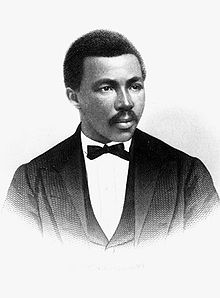Robert B. Elliott
| Robert Brown Elliott | |
|---|---|
 |
|
| South Carolina Attorney General | |
|
In office December 14, 1876 – May 29, 1877 |
|
| Governor | Contested between Daniel Henry Chamberlain and Wade Hampton III |
| Preceded by | Samuel W. Melton |
| Succeeded by | James Conner |
| 28th Speaker of the South Carolina House of Representatives | |
|
In office November 24, 1874 – April 14, 1876 |
|
| Governor |
Franklin I. Moses, Jr. Daniel Henry Chamberlain |
| Preceded by | Samuel J. Lee |
| Succeeded by | William Henry Wallace |
| Member of the South Carolina House of Representatives from Aiken County | |
|
In office November 24, 1874 – April 14, 1876 |
|
| Member of the South Carolina House of Representatives from Barnwell County | |
|
In office November 24, 1868 – March 1, 1870 |
|
| Member of the U.S. House of Representatives from South Carolina's 3rd district |
|
|
In office March 4, 1871 – November 1, 1874 |
|
| Preceded by | Solomon L. Hoge |
| Succeeded by | Lewis C. Carpenter |
| Personal details | |
| Born |
August 11, 1842 Liverpool, United Kingdom (claimed) |
| Died | August 9, 1884 (aged 41) New Orleans, Louisiana, U.S. |
| Resting place | St. Louis Cemetery No. 2 |
| Political party | Republican |
| Profession | lawyer, civil servant |
| Signature | |
| Military service | |
| Allegiance | |
| Service/branch |
|
| Years of service | 1869–1871 |
| Rank | Commanding General |
| Battles/wars | Reconstruction |
Robert Brown Elliott (August 11, 1842 – August 9, 1884) was an African-American member of the United States House of Representatives from South Carolina, serving from 1871 to 1874.
Not much is known for sure about Elliott's early life. He claimed to have been born Boston, but was likely born in Liverpool, United Kingdom to West Indian parents. In England, he received a basic education and learned to be a typesetter. He may have served in the British Navy before coming to America, and he claimed to have served in the U.S. Navy during the U.S. Civil War
Elliott arrived in South Carolina in 1867 at the age of 25, where he established a law practice. Elliott helped organize the local Republican Party and served in the state constitutional convention in 1868 as a delegate from the Edgefield district. In the late 1860s he was hired by AME bishop and fellow future congressman Richard H. Cain to be an associate editor of the paper, the South Carolina Leader (renamed the Missionary Record in 1868), along with another future congressman, Alonzo J. Ransier
In 1868 he was elected to the South Carolina House of Representatives. The next year he was appointed assistant adjutant-general; he was the first African-American commanding general of the South Carolina National Guard. As part of his job, he helped form a state militia to fight the Ku Klux Klan.
...
Wikipedia
